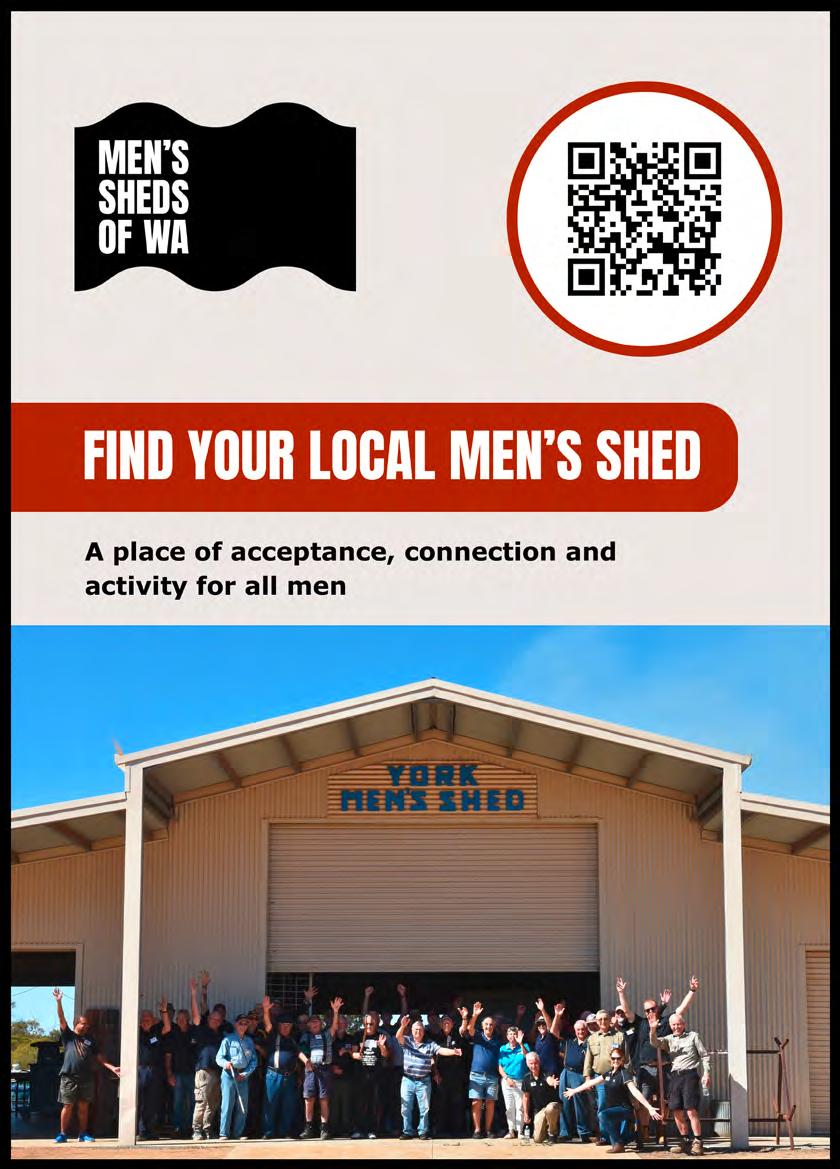SHEDS WA
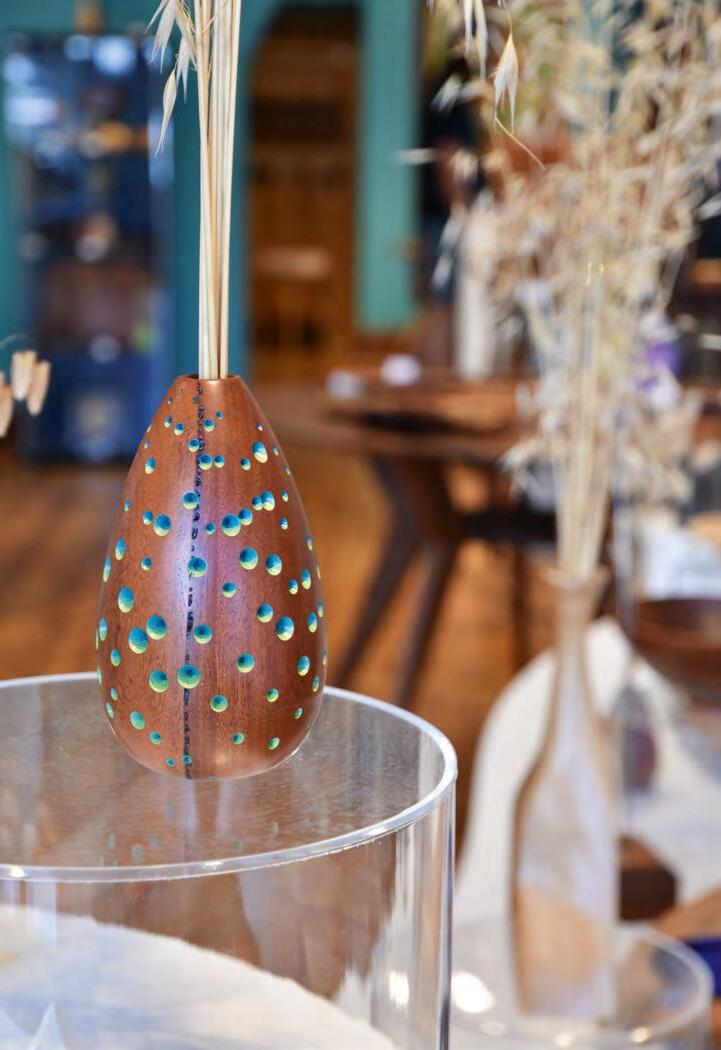
Take a look at some of the achievements from Sheds all across Western Australia in this special edition.

May 2024 issue 04
Celebrating Sheds
thriving sheds connected sheds Subscribe Here
Juniper.org.au | 1300 313 000
homecare@juniper.org.au
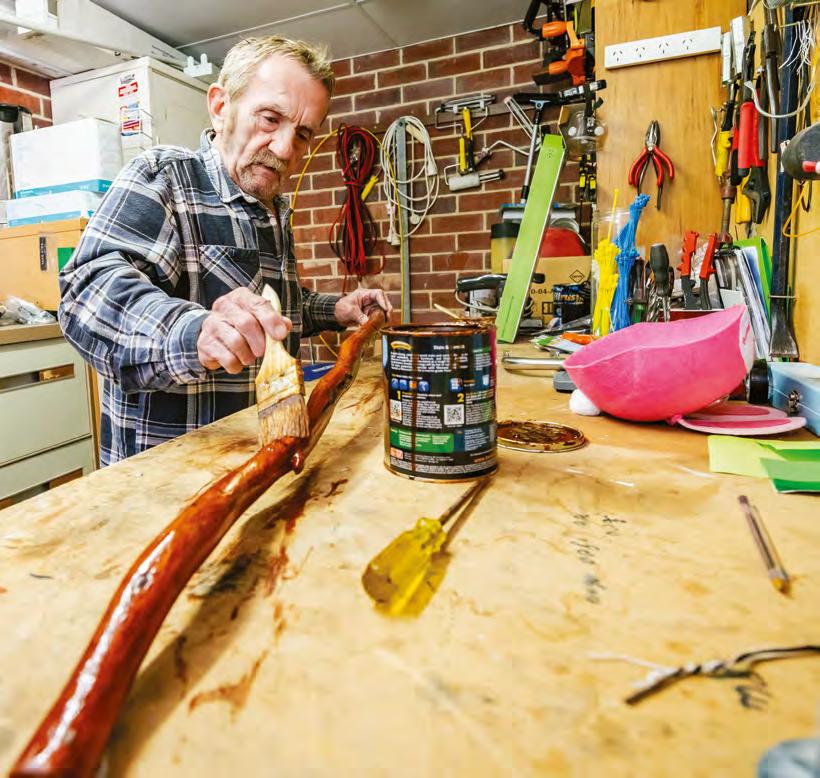
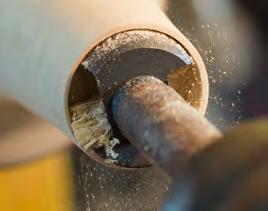
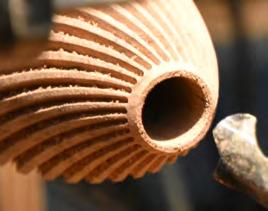

https://mensshedswa.org.au/ shed-resources/sheds-wa/
To discuss stories contribution please contact the team at admin@mensshedswa.org.au
Credit to Gordon MacGilp for producing the magazine
Image credits
Cover: by Rhiannon Arnold
Page 6-7: Serpentine-Jarrahdale Men’s Shed
Page 8-9: by Rhiannon Arnold
Page 10: (left) Cockburn Men’s Shed (right) Katanning Men’s Shed
Page 11: Katanning Men’s Shed
Page 12-13: by Rhiannon Arnold (Except for top left, top second from right, and bottom third from right – all supplied by Dean Malcolm)
Page 14-15: Ross Wortham
Page 16: James Wild
Page 19: Road Trauma Support WA website
Page 20-21: Perth Wood School
Page 22-23: Main image by Rhiannon Arnold, smaller images by Rebecca Talbot
Page 24: by Rebecca Talbot
All rights reserved. No part of this publication may be reproduced, stored in a retrieval system, or transmitted, in any form or by any means, electronic, mechanical, photocopying, recording or otherwise without the prior written permission of the Publisher and copyright owners.
The contents of this publication are believed correct at the time of printing.
If you would like to comment on any aspect of this newsletter, please contact us on: (08) 6381 5324 or e-mail: admin@mensshedswa.org.au www.mensshedswa.org.au facebook.com/mensshedswa
Nevertheless the Publisher can accept no responsibility for errors or omissions, changes in the detail given or for any expense or loss thereby caused.
Men’s Sheds of WA does not warrant that any website mentioned in this title will be provided uninterrupted, that any website will be error free, that defects will be corrected, or that the website or the server that makes it available are free of viruses or bugs. For full terms and conditions please refer to the site terms provided on the website
3 Contact Us / Credits 4 Welcome from CEO 6 Serpentine Jarrahdale Men’s Shed 8 Lake Monger Community Shed 10 Tea, tools, and togetherness 12 Dean Malcolm 14 Ross Wortham 16 Building Communities 18 Road Safety 20 Safety first 22 2024 Zone Meeting Summary 24 Sheds Saving Lives Post-Retirement Primary Primary - Reversed Vertical ertical - Reversed Contents
To provide content:
MAY 24 NEWSLETTER 3
SHEDS WA
Hello from the Sheds WA team!
We have another great page-turner of a magazine for you in this edition of Sheds WA. As ever we express our sincerest appreciation to all our advertisers and supporters, their support is helping the magazine to grow and helps us to continue promoting the community and craftsmanship that defines the Men’s Sheds movement.
In this edition, we have stories that unveil the extraordinary work happening in sheds across Western Australia. From stories of mateship to awe-inspiring projects that showcase the ingenuity of our members, there’s something here to reflect all aspects of shed life.
We are delighted to feature two articles on master craftsmen from WA; Ross Wortham
and Dean Malcolm. From woodworking wisdom to mental well-being guidance, we’re covering a lot of ground in this issue! We are on the lookout for more stories and photos from Sheds and the community. Get in touch if you have stories of:
• Mateship and camaraderie
• Woodworking and craftsmenship
• Community projects
• Men’s health and wellbeing
Happy reading.
James Wild CEO, Men’s Sheds of WA
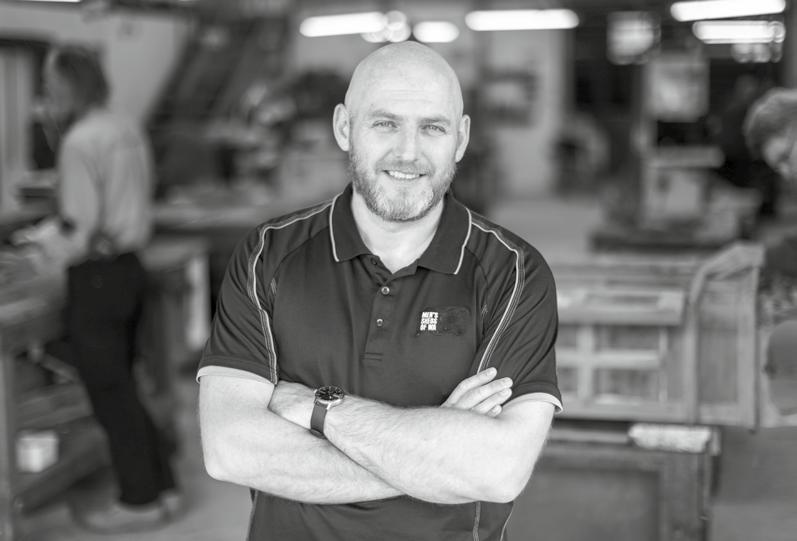
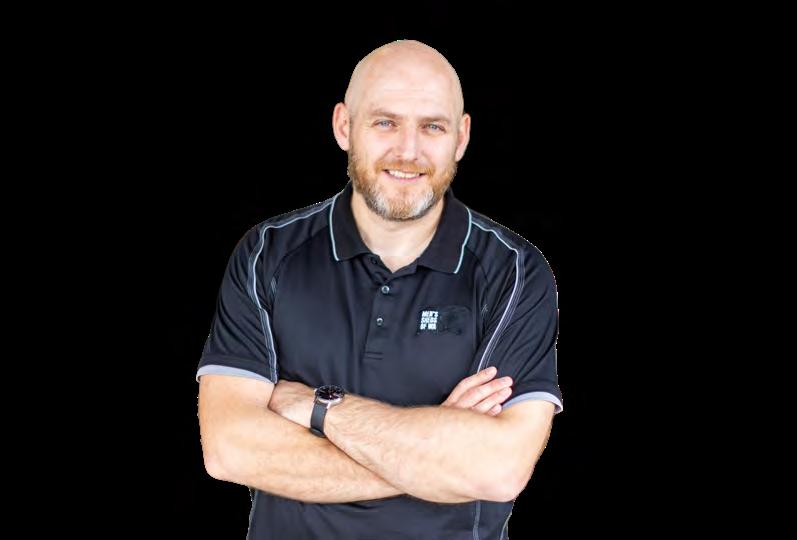
4 sheds wa
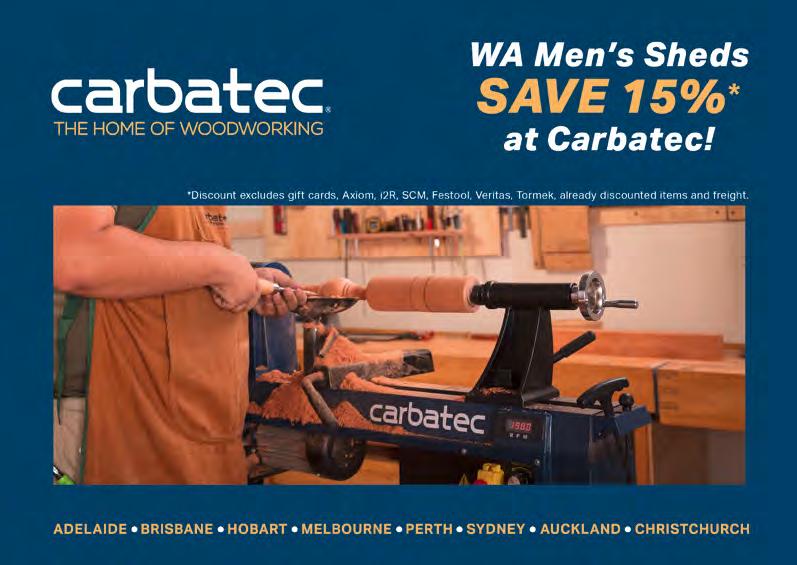

Call 1800 658 111, visit your local store or carbatec.com.au carbatec.com.au
Serpentine Jarrahdale
Men’s Shed Shed in Focus
It’s been a busy start to the new year for the Serpentine Jarrahdale Men’s Shed.
Skilled hands have been flat out creating mud kitchens and bespoke toys for the littlies. And a few have been polishing up their resin craft.
A menagerie of emus, kangaroos, wombat and possums were constructed as part of a commission for the Water Corporation, and another batch of beautiful picture frames crafted from 100-year-old Jarrah were completed for the Old Engineers Hours at Canning Dam.
Some members have taken on large jobs in the outside slabbing area, with a beautiful 1100x3000mm table heading down south to own lucky new owner, with more slabs on the go for the Jarrahdale Tavern. And the
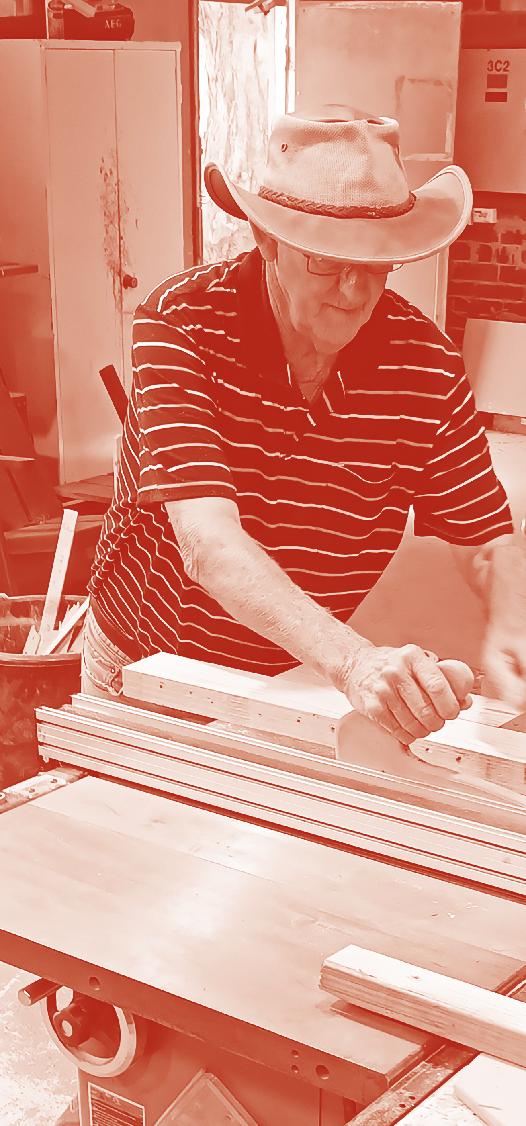
new Serpentine Primary School benches are just about complete. The Shed itself is beginning to transform, with a raft of upgrades.
The shire donated another 20ft container which has been set up as a storage unit, freeing up the ‘chainsaw container’ for more mechanical work, with the saw and blade sharpeners now relocated into it.
An ablution block which was also donated by the shire nearly a year ago is now in situ, and there are hopes that it will be connected soon to free up space inside where the existing toilets are situated.
The kindling machine was recently upgraded with a new motor and electrics and has been flat out ever since with a new operate dubbed ‘Jarrah John’.
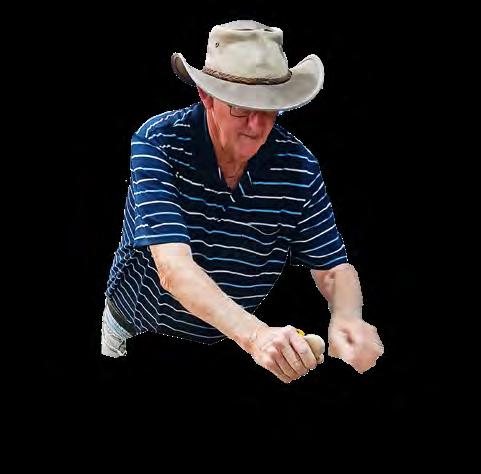
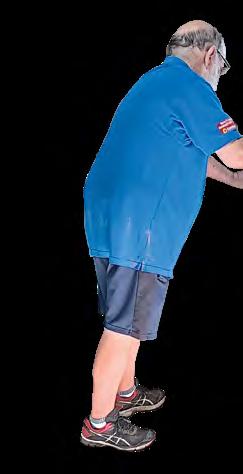

6 sheds wa
There’ll be no shortage of kindling for sale this winter, with Jarrah John on the case.
But it hasn’t all been hard yakka – there’s been plenty of socialising too.
In January, the shed hosted a sundowner send-off for ex-Vic President Barry Johns, who has relocated to a new life in Busselton.
And in February the Shed had a visit from around two dozen members of the Kalamunda Men’s Shed – all impressed with what has been achieved.
Their visit offered an opportunity for a bit of training on the new CNC Router which had been sitting idle since its purchase last year. Members are finally getting to grips with what it can do.
Serpentine Jarrahdale Men’s Shed


secretary Ray Schmidt said new members are starting to trickle into the ‘Shed in the Scrub’, but there’s always room for more.
“If you think you have a skilled that could be of use, or just wanted to pop in for a visit occasionally, we’d love to see you,” he said.
“It’s hoped that once we get the new toilet block commissioned, we will be able to create a lounge area for those that just want to chill out.”
The Serpentine Jarrahdale Men’s Shed is located at 214 Baskerville Rd in Mundijong.
The article first appeared in The Examiner on 14 March 2024.
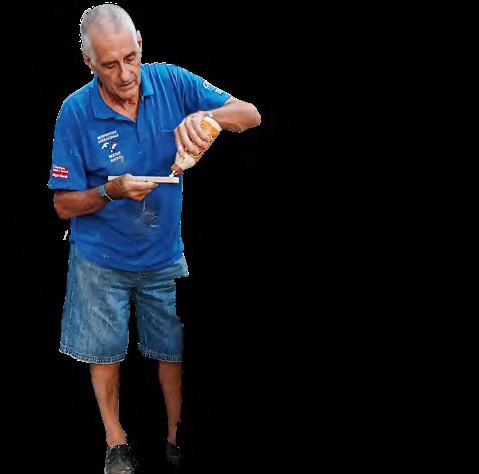
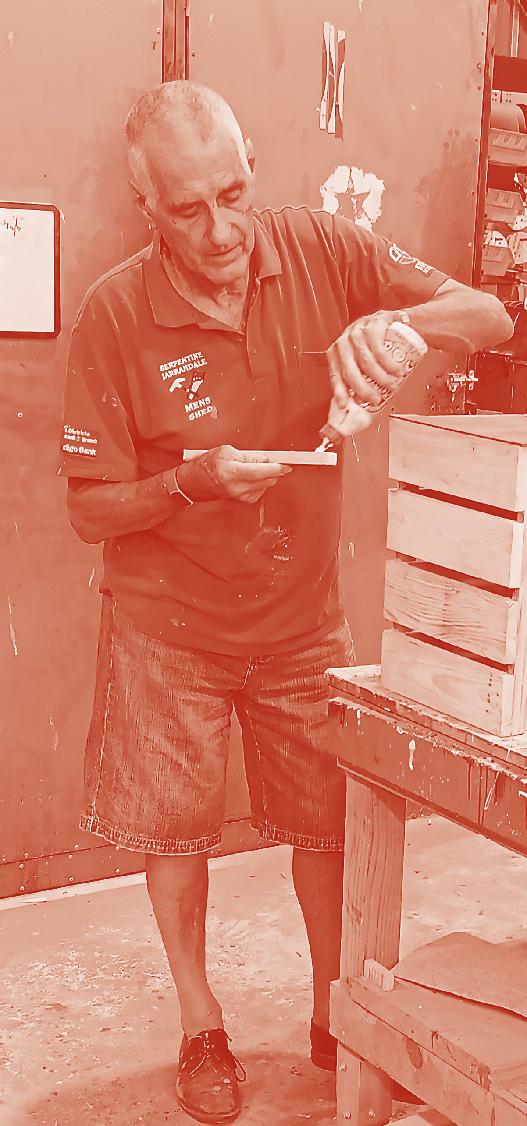
MAY 24 NEWSLETTER 7
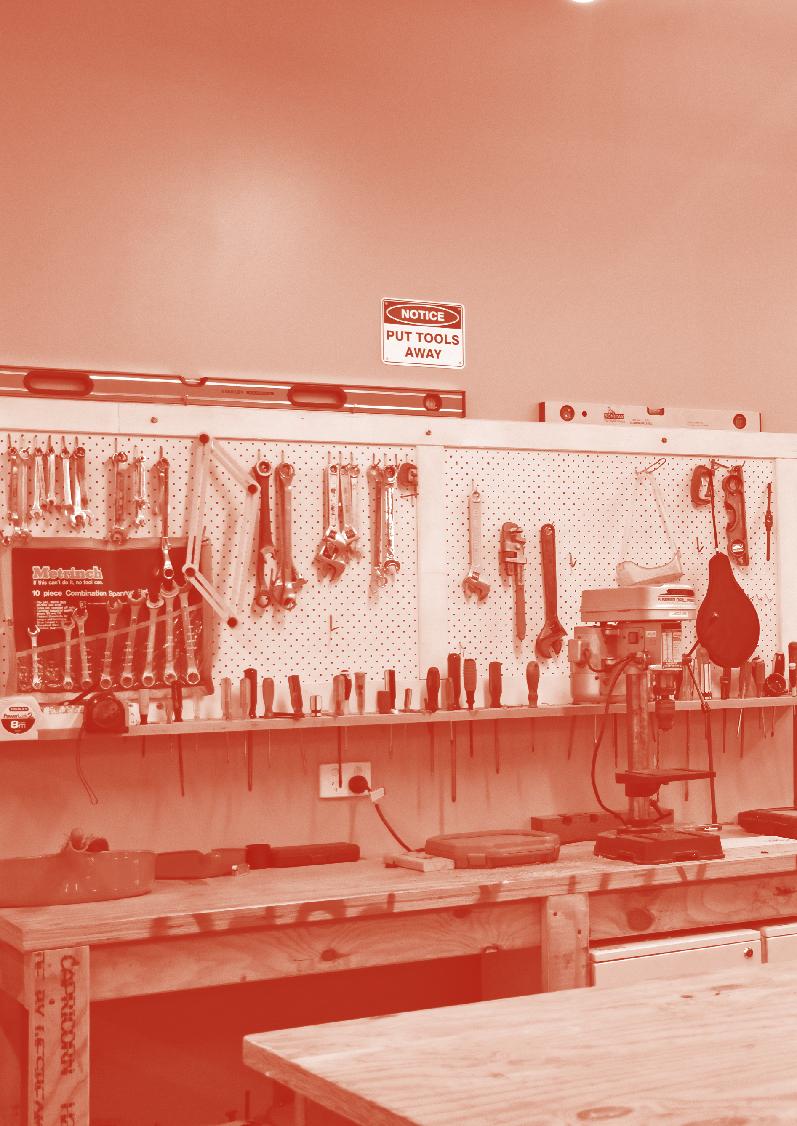
Lake Monger Community Shed A Shed for the Whole Community
By Rhiannon Arnold
The Lake Monger Community Shed (LMCS) is lucky enough to boast one of the greatest shed locations in WA. Nestled between native gardens and overlooking its namesake Lake Monger, it’s no wonder they have members joining from all over the Perth metro.
In just 18 months LMCS has grown to include almost 300 members.
Chairperson Andy Oldham said their members come from all around Perth because of their wide array of activities.
“The likely reasons are that we do not exclude anyone based on gender and we offer a different environment from many other Sheds,” Andy said.
“Our pottery facilities, wheels, kilns and expertise are a point of difference to other Sheds.”
The LMCS was originally established with woodworking as the main activity, however when one of the members suggested including ceramics as an option, they created a pottery facility.
“Roz Mckenzie is an experienced and talented ceramicist and suggested that we use a small area of the shed for ceramics,” Andy said.
“This has grown to be own of the most popular activities at the Shed, and is obviously meeting a community need for this service.
“We now have a well set up area with two electric kilns, eight potter’s wheels and areas for hand building.”
In addition to woodwork and ceramics, the shed is also set up for metal work, welding, 3D modelling and printing, CNC building and art. And just like with Roz,
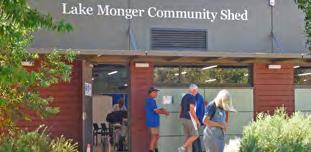
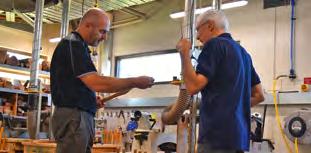
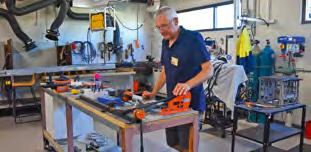
they’re always open to suggestions from their members too.
“Our members are able to work on their own projects, but it is also intended the Shed make articles and carries out activities for other community groups and to raise funds to support Shed running costs,” Andy said.
One such community project is an activity wall being constructed for Ronald McDonald House and the Children’s Hospital.
“We are only a young Shed and are just starting community projects which require all the group to be involved,” Andy said.
“For this project, the woodwork group will construct the wall, the 3D group are making some of the toys with the CNC
8 sheds wa
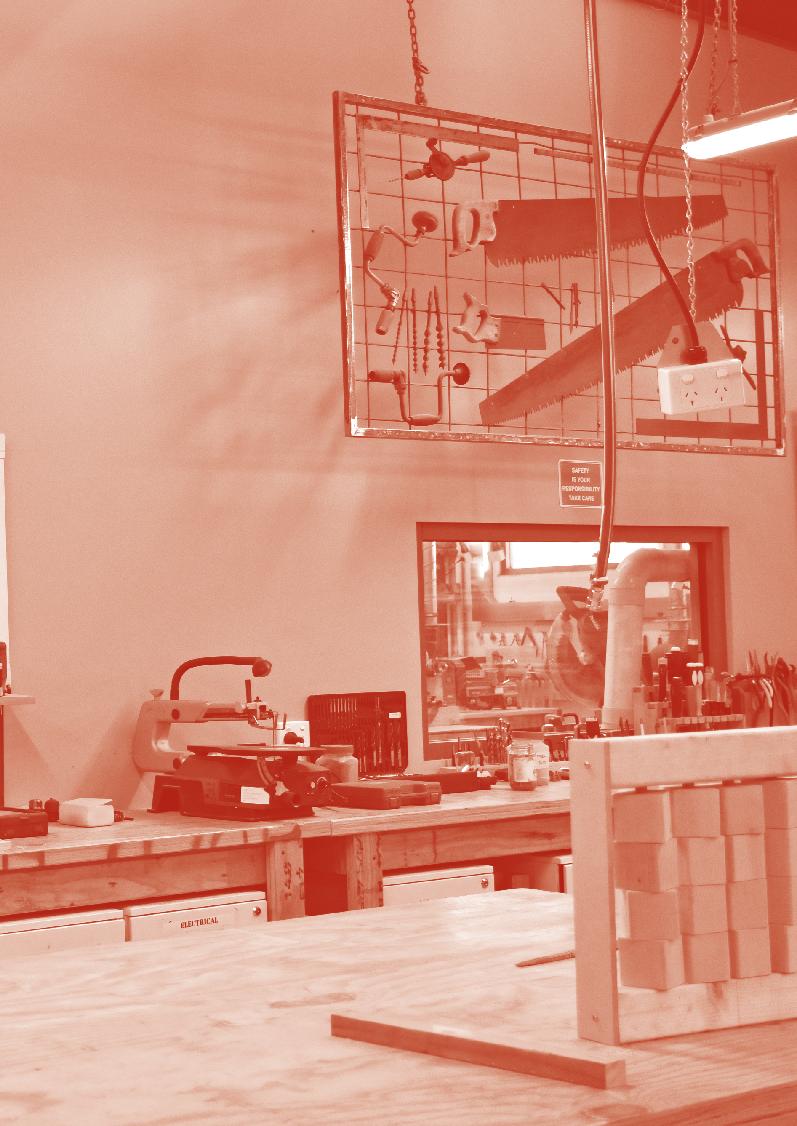
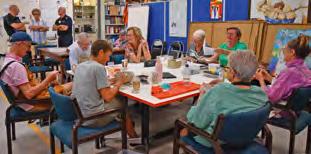
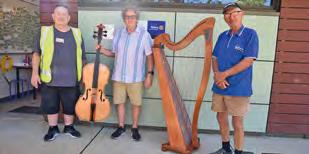
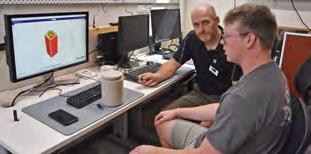
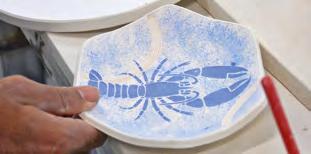
and the pottery and art group are adding some of the finer details.”
This cross-shed collaboration can be seen amongst the members in all their activities, with members bouncing ideas off each other as they discuss their own projects.
Men’s Sheds of WA CEO James Wild said the LMCS strength lies in their diversity of members and activities.
“From woodworking to ceramics, metalwork to art, the shed buzzes with creativity and collaboration,” James said.
“Whether it’s crafting a masterpiece or working on community projects like the Ronald McDonald House activity wall, every member plays a vital role.
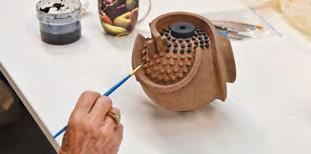
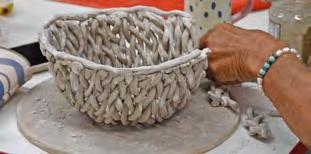
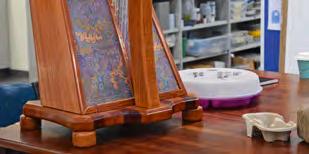
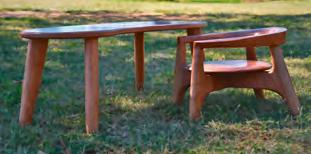
“The Lake Monger Shed thrives because of inclusivity and its doors are open to welcome new ideas.”
It’s a great example of inclusivity in Sheds, and working collaboratively with members.
“Sheds provide an important focus for people within the community to have a place and purpose meet and support each other,” Andy said.
“There are a huge variety of Men’s and Community Sheds within the Western Australia, and it is important to have that diversity to meet everyone’s needs and requirements.”
Find out more about Lake Monger here www.lakemongershed.org.au
MAY 24 NEWSLETTER 9
Tea, tools, and togetherness
Men’s Shed WA is crafting connections from city streets to country roads.
By Chloe Henville
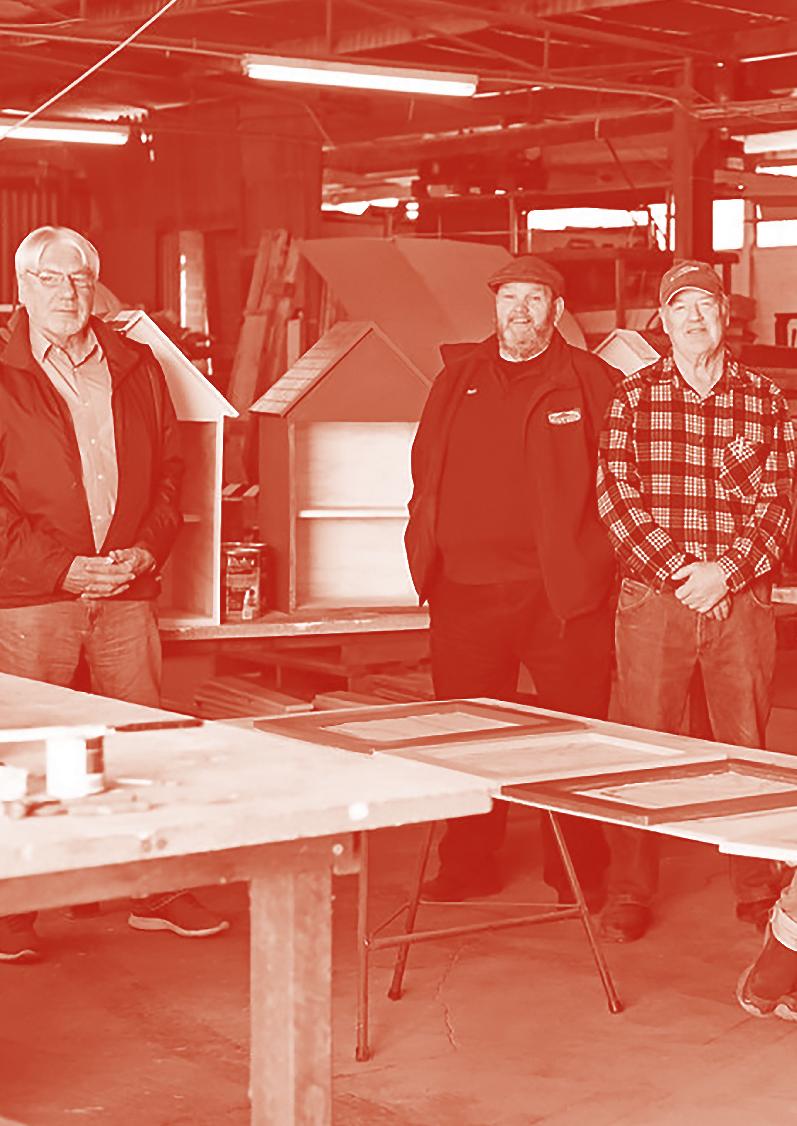
You hear the shed before you see what’s inside. The fizzing whine of a hand saw mixes with the grumpy bustle of a sander, combining to create a chaotic symphony of work noises that can give you a headache within a minute.
The members of the Katanning Men’s Shed, mostly retirees, have been working since 9 am, and just an hour later it’s time for their next important task: to stop for a 10 o’clock cuppa and conversation.
“We sit down and have another coffee, chat, tell jokes – and generally mix in,” said Katanning Men’s Shed President Ross Thomas.
This is key to how Men’s Sheds are trying to overcome modern social isolation. In a fast-paced world where we carry the ability to connect in the palm of our hands, loneliness is a growing concern. In fact, the World Health Organisation has identified loneliness as a ‘pressing global health threat’.
Add in the physical isolation of living in Katanning, a town nearly two hours from Albany and over three hours from Perth, the effects of solitude can be amplified.
“Being in the regional areas also brings a sort of loneliness,” said Ross.
“I mean I’ve lost my wife, so I’d be sitting at home on my own, and I know that when
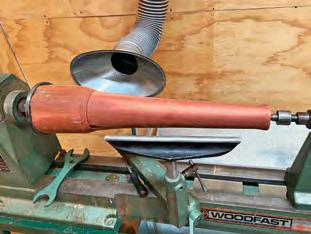
she passed away it was the Men’s Shed which pulled [me] through.”
But does this social isolation also ring true for our capital city, as much as it does the rural towns scattered throughout Western Australia?
Despite being close to neighbours, Perth residents aren’t immune to a lack of meaningful connections. After speaking to the Cockburn Community Men’s Shed’s chairperson Mike Murphey, it’s evident feelings of isolation are just as prevalent in the city.
“Loneliness and depression are two huge factors in getting guys down here,” Mike said.
“The whole idea of the Men’s Shed is to keep mainly retired guys from sitting, being bored, isolated, and lonely at home… it’s the underlying ethos for the whole Men’s Shed program.”
While the Katanning Shed has its daily routine down to a tee, ticking away at projects for their Shire and local organisations, Mike says there is no ‘typical day’ at the Cockburn branch. He recounts how just a week earlier a young man came in with a chunk of Jarrah, asking for a custom peg leg.
“He said he’d lost his own leg down past the knee, so he whipped his trousers up
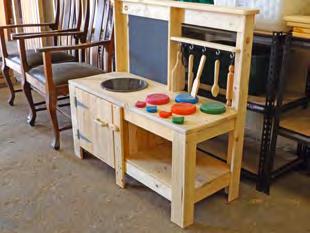
10 sheds wa
and pulled off this titanium leg. He said, ‘this is the leg I normally use, but when I go to fancy dress shows I want to go as a pirate!’” Mike said.
But just like at Katanning, it’s tools down at 10 am for a cuppa. For both locations it’s more important than just tea or coffee. It’s about taking the valuable time for a chat, talking through problems, and building lasting friendships.
“The whole concept of the Men’s Shed –and I’m preaching to the choir here – is to keep the guys physically and mentally active while not stressing them out,” said Mike.
He noticed lots of members join after downsizing their property, saying city folks often have to wave goodbye to their shedand with it, a space to get out of the house and dive into hands-on projects - when leaving their ‘boomer box’.
“A boomer box - according to my kids - is a four-by-two house with two people living in it on a large block.”
Moving to a smaller home or retirement village means these men don’t have the space to potter around or the equipment to carry on with former hobbies such as woodwork and metalwork. The Cockburn Shed provides the opportunity maintain a
down to these sheds, the camaraderie for one thing, but also for the tools that they used to have and they now don’t,” said Mike.
While city and regional Sheds may have a few different drivers for membership, there is a large overlap. The most frequent reason: retirement. Mike and Ross saw this among their local members, part of which stems from Aussie men’s culture where a heavy emphasis of value is placed on work.
“The common factors are the loss of importance in what you do, because guys identify very strongly with their job rather than who they are and I think that encompasses both country and city people,” Mike said.
Regardless of where you live or why you may decide to join a Men’s Shed, both Ross and Mike agree it provides immense value to members’ lives. Whether you’re from inner-city Perth or rural Western Australia, a Men’s Shed is an opportunity to connect with people and share your thoughts.
As Ross from Katanning said, it’s about “companionship, meeting up with new people, sitting down and sharing ideas, sharing jokes, sharing stories.”
“And of course, the cup of coffee - can’t forget that!”
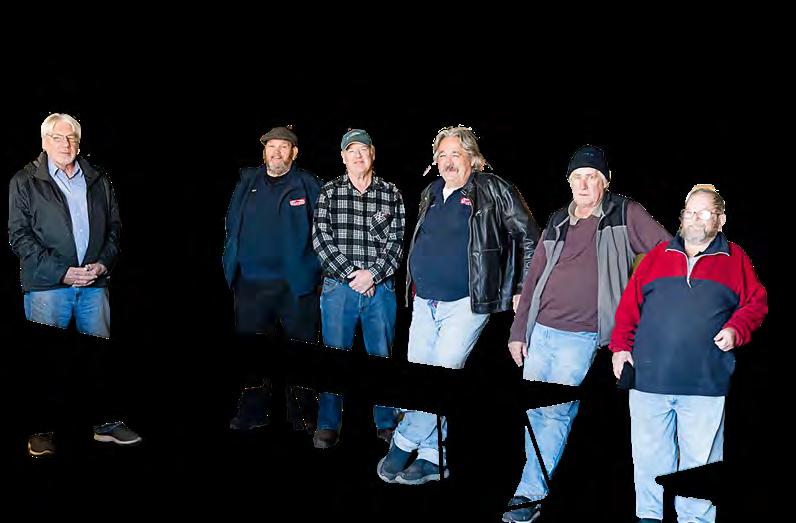
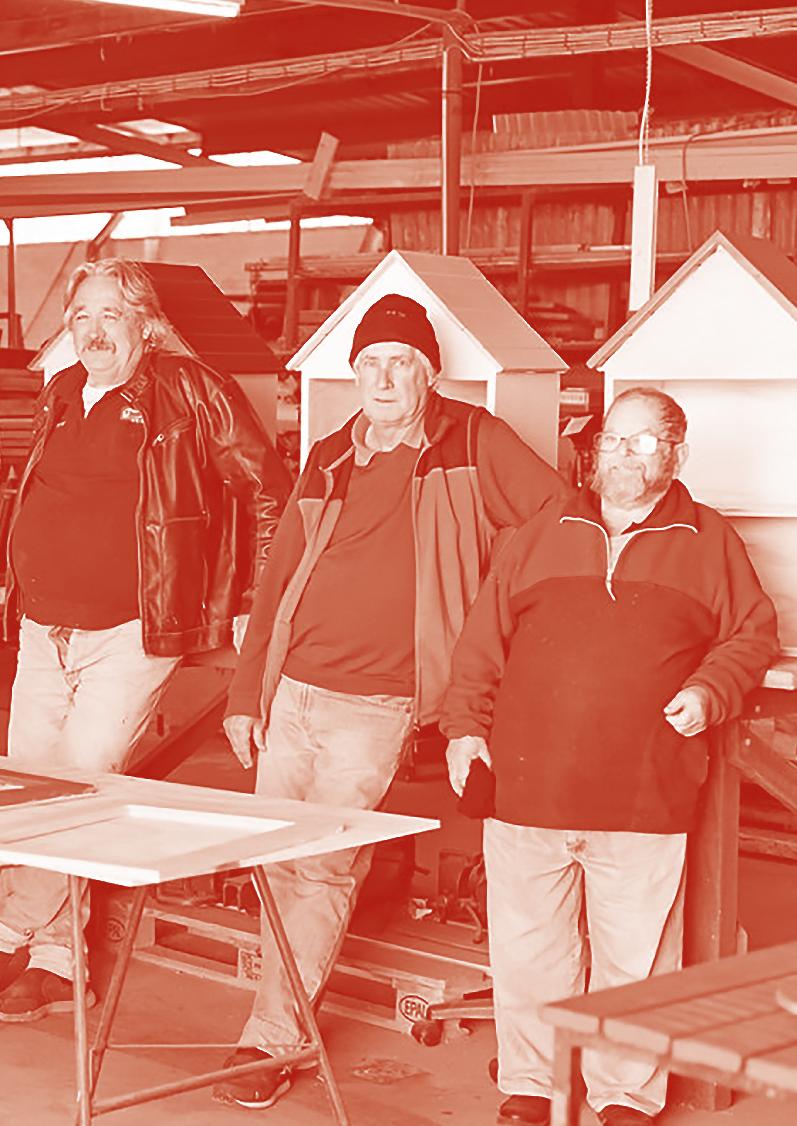
Dean Malcolm Master Craftsman in the South West
By Rhiannon Arnold
Dean Malcolm has been wood turning from the age of 14, but it wasn’t until a conversation with his accountant that he decided to pursue an automation journey that would allow him to maximise his business.
Over his career, Dean has created one-of-akind pieces which have been exhibited across Australia and around the world, including a piece he presented to H.M Queen Elizabeth II.
In the early 2000’s Dean began to explore ways to automate his wood turning, which both allowed him more time and reduced the physical impact of the job.
“My accountant around that time had told me my business had no value, it was me,” Dean said.
“Because I was the person who had to be working to get anything out of the workshop, the business had little value, it was all resting in me.”
Dean said this came as a bit of a shock and built a machine that was able to replicate the movements he was doing by hand and switch itself off when it was finished.
“One of the very first machines I built was the bottle stopper machine,” he said.

“I got to the point where I had a machine where I could press a button and two minutes later it had finished the process and switched itself off.
“That machine created time for me to work on something else. So, from then on, I’ve always looked for processes I can automate somewhat to allow me to work on something else.”
These automated processes, created from machines Dean has custom built himself, have allowed him to expand his studio output to over 150 product lines.
“It’s amazing how much we can do. For example, the bud vase is just one product line, but there are 40 different designs in the bud vases,” he said.
“In terms of volume, it’s a lot of things but it’s all about keeping everything running.”
This process of automation has been just as important to Dean as the wood turning itself.
It has allowed him the time to create fine details in his work and take inspiration from old techniques and apply them to modern machinery.
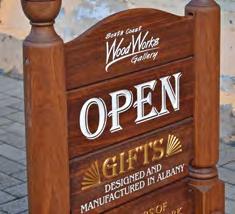
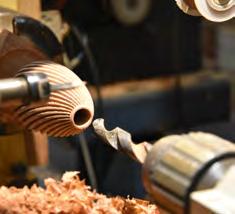
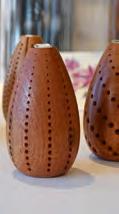
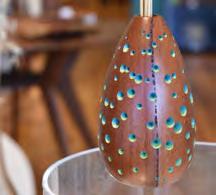
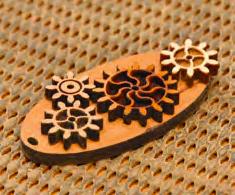
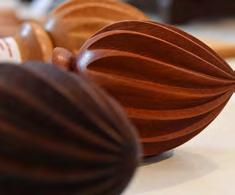
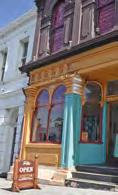
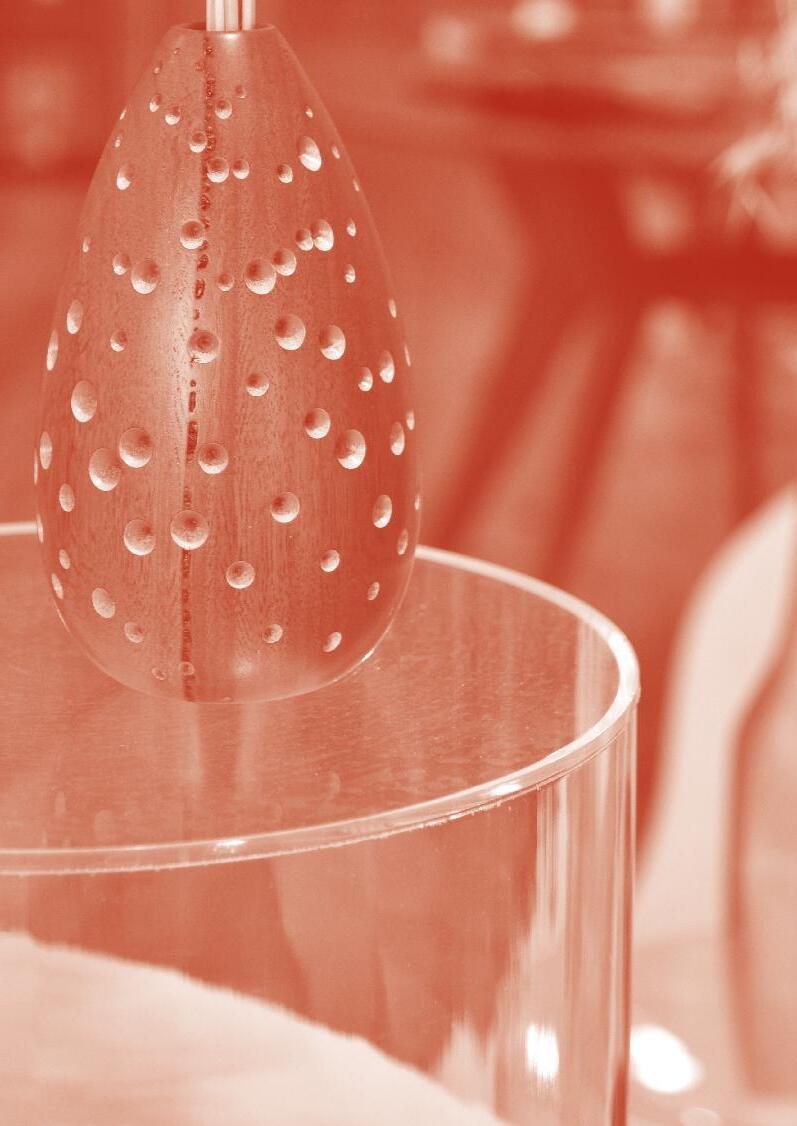
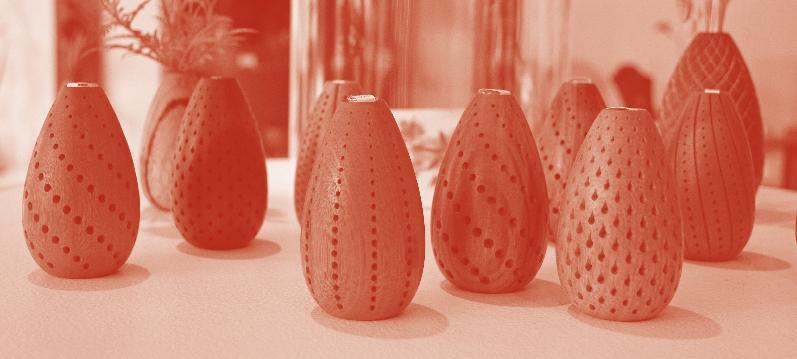
“When you look at the bud vases where you see fluting and little decorations on it, a lot of that is inspired by the techniques they used back in the 1800’s,” Dean said.
“It’s just that they used a really old bit of gear with a pedal tread to run the cutters and now I use high tech digital controls.
“When you start putting all these other techniques in, it doesn’t matter what the wood looks like; you can start with the most basic and boring timber and come up with something really incredible.”
Dean said this lets him explore a more creative woodworking journey than just hunting for a special piece of wood.
From that first machine, Dean’s studio is now filled with dozens of automated woodturning, cutting and sanding machines.
“The first advanced turning machines were built around 2004 when I started incorporating computing numeric control (CNC),” he said.
He has used old photography mini labs and photocopiers to create his custom machinery.
“The machines here are rebuilt from other things. When I started on this journey of building these machines it was hard to find parts,” Dean said.
“I took out all sorts of mechanical parts and I was able to build my first CNC router from [an old photo mini lab].
“It took about three months to get the machine, learn how to run the motors and
do those things to get it all working and build the router, but that was the beginning of the real automation journey.”
Combining the traditional woodturning techniques with modern technology has meant Dean can create a sustainable woodturning business that can evolve with new ideas.
By reducing the time and labour-intensive aspects of woodturning Dean can explore new designs and ideas and apply them to his ever-evolving work.
He said this is a principle that can be applied in Men’s Sheds.
“The thing to remember is that were will be a lot of people out there with a bit of knowledge or a specific skill set.
“The challenge will be to get the right people using the right tools in the Men’s Shed’s to help others.
“If you’ve got people who are good with computer skills, they need to be helping the people who want to use the laser … or people on the CNC.
“It’s great to have the equipment but you need people who can use it,” Dean said.
By sharing and combining skills, Men’s Sheds can create more streamlined, sustainable processes just as Dean has done.
Today Dean’s work can be seen in the South Coast WoodWorks Gallery in Albany, where he works with his partner Jackie.
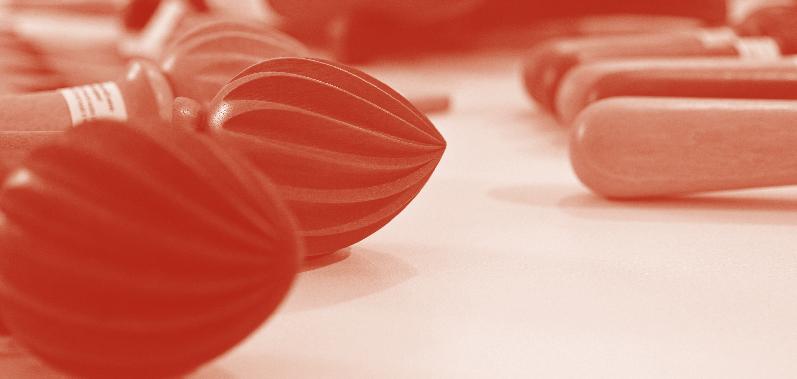
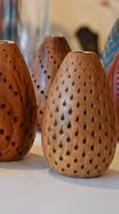
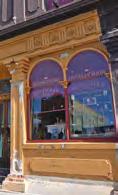
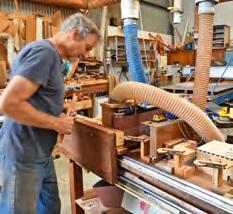
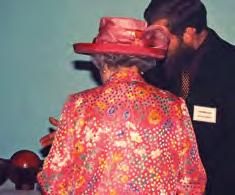

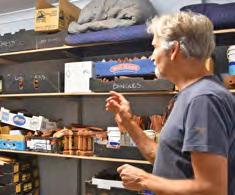
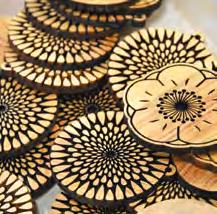
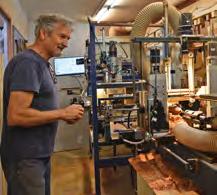
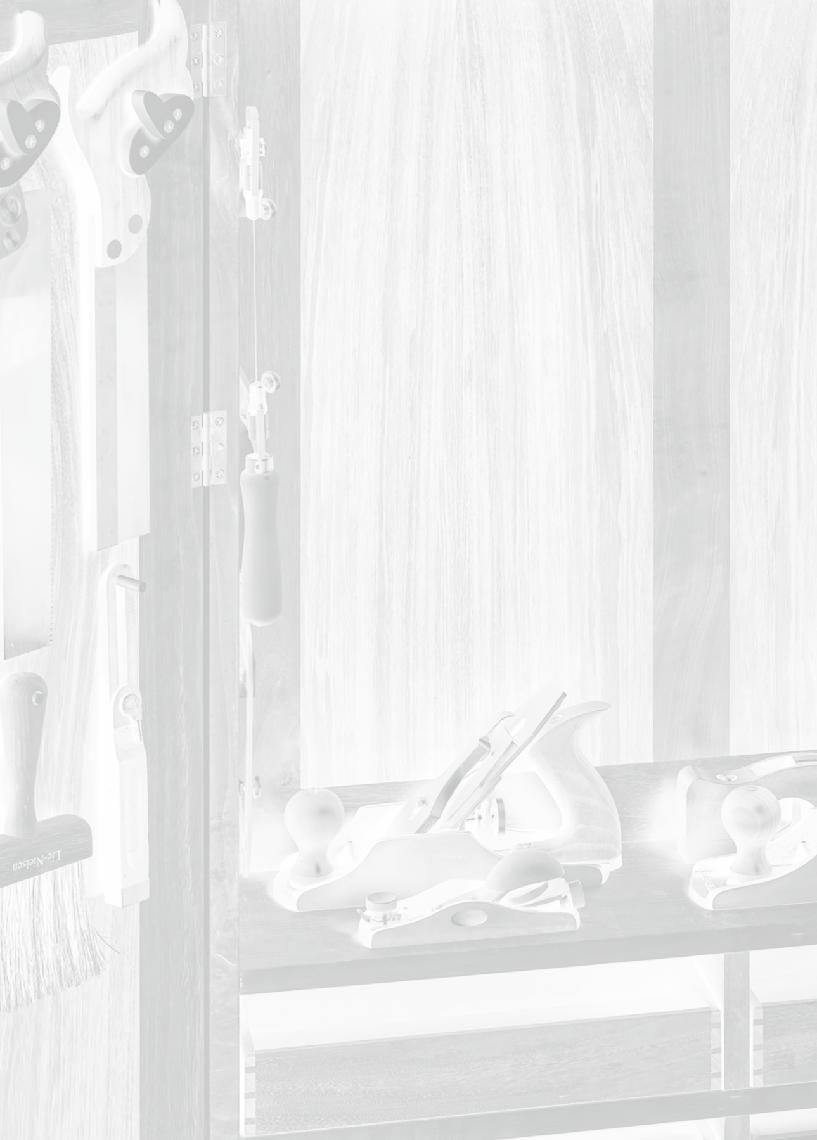
Ross Wortham
By Rhiannon Arnold
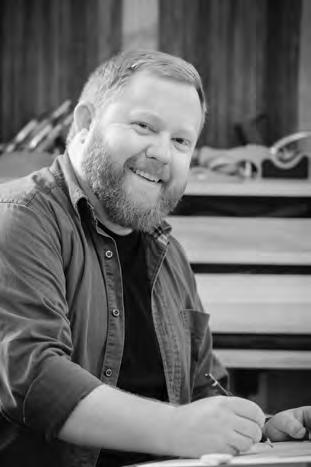
WA Social Enterprise Council CEO, Ross
Wortham’s woodworking journey began during the COVID-19 pandemic, when he found himself with more time than usual on his hands. He started with simple projects like boxes and frames, guided by YouTube tutorials, but his interested quickly grew.
Ross’s wife enrolled him in a short course at the Perth School of Wood, which marked the beginning of a deeper dive into woodworking. When he applied for the Sturt School of Wood course, he never expected he would be one of the 12 people accepted. Ross studied under some of Australia’s top designer-makers, refining his skills and embracing a self-proclaimed ‘perfectionist’ approach to his craft.
“We just threw caution to the wind and decided ‘let’s put our house up for rent,’” Ross said.
“We had already been on sabbatical for our baby, and we moved to New South Wales and we spent 14 months [there].”
Ross’s craft philosophy centres on the importance of preserving craftmanship in an era dominated by mass production. He believes handmade pieces not only possess enduring quality, but also help to maintain cultural heritage and skills. His goal is to create pieces that can last generations.
“I want to make something I know will be around for … five or 10 generations. Something that you can call a family heirloom, that will not have a manufacturing issue but beyond that, it’s piece that has deep care and love in it.”
This attention to detail, coupled with his CEO responsibilities has meant Ross’s woodwork takes a lot of time to finish.
“[My most recent piece, a whiskey cabinet took] 8 days, maybe a bit more, 10 days’ worth of work,” he said.
“If you equate that to an hourly rate across 10 days plus materials, it’s like - I don’t want to say it - it’s probably like an $8000 cabinet.”
Ross has recognised the big price tags that come with bespoke pieces prevents a wide array of people from ever purchasing one.
“We don’t have as much of a marketplace [in WA],” he said.
“That’s the nice thing about the Bungendore Woodworks Gallery, it’s located close to Sydney and Canberra.”
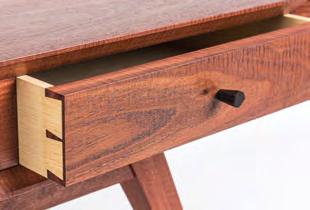
14 sheds wa
Looking to the future Ross would like to make bespoke woodworking more accessible by exploring ways to offer quality pieces at a more affordable price point. He draws inspiration from renowned Australian designer-makers such as David Upfill-Brown and Neil and Pam Erasmus, while also staying true to his work in community service.
“I come from a community services background and most of my career has been dedicated to people, and supporting people in poverty,” he said.
“I’ve decided to go down a creative and artistic passion where the people who can afford it are in the upper echelon. They’re the lawyers, the heads of companies, the politicians.
“I’m speaking to a totally different audience, and I’d love for us to find a balance and be able to give people like me access to that sort of quality.”
As the world increasingly moves towards mass production and away from unique craftsmanship Ross would like to see a balance between the two production methods to allow more people to access fine furniture.
“I personally believe we need to keep craft alive,” Ross said.
“If all we have is mass production the quality of our environment, the quality of the items in society … will actually become worse.
“I think that’s a good goal for life, to try and be a bit more connected to the consumption and the production that is in our lives.”
Ross sees woodworking not only as a creative outlet but also as a means of promoting mental wellbeing. He encourages others to embrace woodworking as a hobby.
“[Woodworking] is about my own mental health and my own journey, that I think can speak to Men’s Sheds,” Ross said.
“Whilst you’re making, you’ll hear a lot of makers talk about flow and when you’re in flow and in that process, I guess it’s like this form of meditation.”
His story highlights the importance of pursuing ones interested outside of traditional roles, bridging the gap between craftmanship and community engagement.
“What a great place to start [woodworking].
A Men’s Shed, where you’re surrounded by a lot of experience,” Ross said.
“If thinking it has to be perfect is a barrier to trying … let’s just throw away perfection and say let’s just have fun.
“[In a Men’s Shed] you’re surrounded by people who have good ideas and
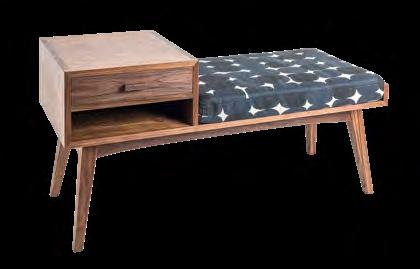
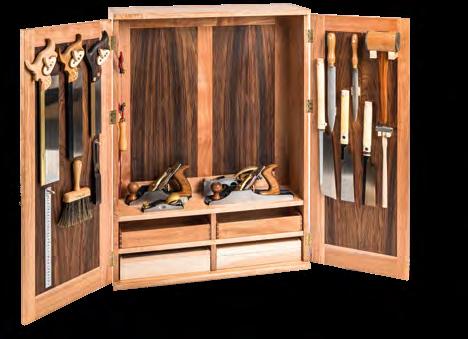
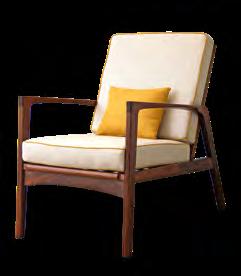
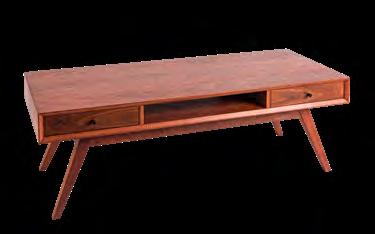
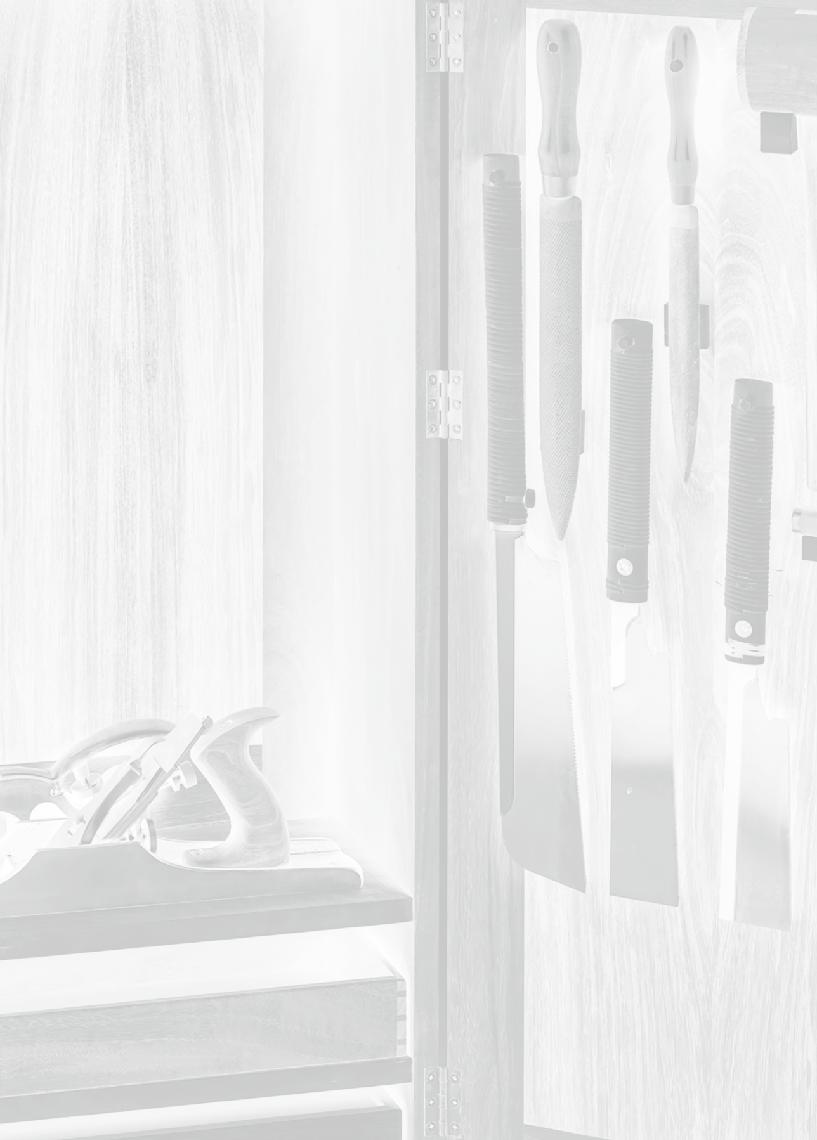
Building Communities
By Rhiannon Arnold
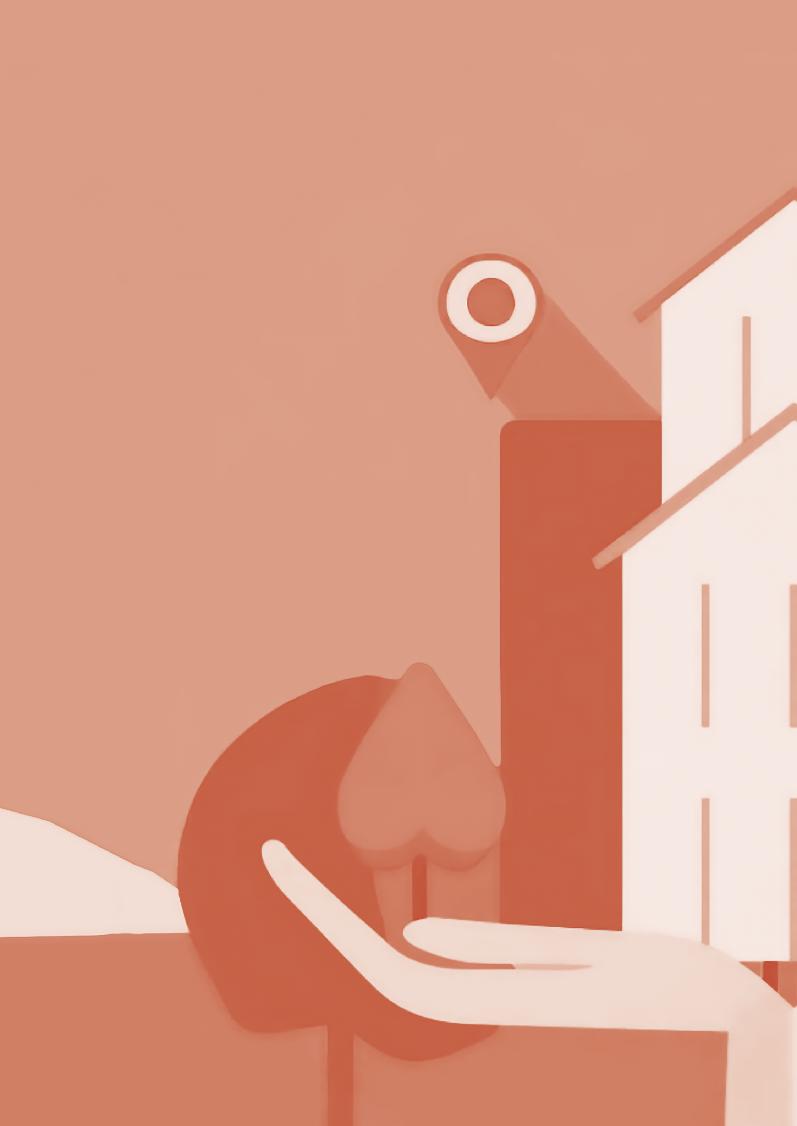
Supporting the local community is a priority for many Men’s Sheds around Australia. The Leschenault Men’s Shed have found a very special way to contribute to their community by making memory boxes for the Bunbury Regional Hospital.
Leschenult Men’s Shed president Paul Fonck said it all came about during the Covid-19 pandemic.
“The [midwives] from the hospital were giving the mother’s boxes they bought in Kmart,” Paul said.
“But then most of the shelves were empty, they didn’t have anything, and they came to the shed and asked if we could make a memory box.”
The boxes are given to families who have experienced perinatal loss.
“When the people were leaving, all they got was an invoice for $3,000 cremation, and now they have a box with all those trinkets, like the bracelets and the toys they’ve already brought in,” Paul said.
“They all go in the box, and they take it home and they have something they can treasure forever.”
Paul said it’s important for Men’s Sheds to be involved in their community to keep members feeling connected.
“We were having a sausage sizzle, and a lady came up to us and said, ‘you made the memory box for my sister’s baby,’” Paul said.
“It’s confronting sometimes, but it’s a reminder that we are doing something good for the community.”
“We have one gentleman who was a furniture maker, and he likes to make the boxes. He is very dedicated to that job.”
The shed members also use their skills to help restore old furniture and build toys.
While giving back to their local community is a huge part of the Leschenault Men’s Shed activities, the Shed community itself has always been the primary focus.
“The most important thing for the Men’s Shed is that people feel they belong somewhere, and they are a part of something,” Paul said.
Even those who are unable to help with the community projects are welcomed at the Shed.
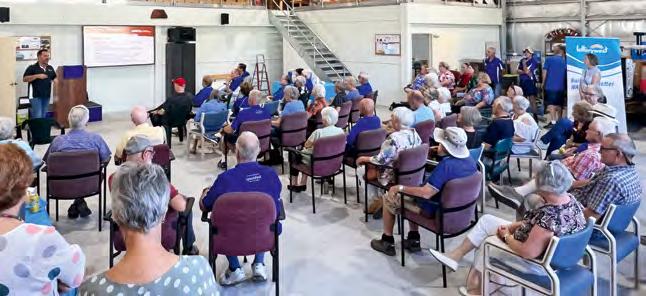
16 sheds wa
Western Sheds
SUPPORTING MEN'S SHEDS OF WA
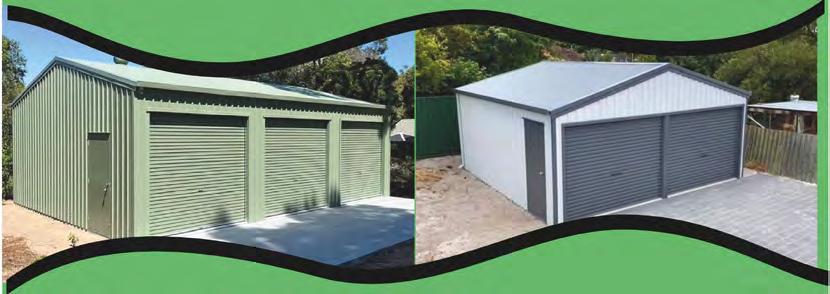
They have recently built a new 400m2 shed as a quiet space for members to talk to each other, without needing to be on the machines.
The new shed features adjustable benches to ensure an ergonomic environment that can include everyone.
“In the shed we have some people who are not working on much anymore,” Paul said.
“We call it Daddy’s Day Care. Some of the older gentlemen, their wives drop them off and they come and have a coffee in the morning and talk about all the problems in the world and then they get picked up and they’ve spent the morning somewhere else.
“We have members who have had kidney transplants or lung transplants; people who would otherwise be sitting at home but now they are part of the shed and part of a movement.
“Even if they can’t do much anymore, we give them something to do, no matter how


small and they are part of the project.”
The Leschenault Men’s Shed currently has 115 members, which Paul said is steadily growing.
“That’s why we needed [the extra shed],” he said.
“Now it gives us the facilities for everybody to come.
“Everybody wants to belong somewhere and the Men’s Shed is another part of that.
“We want to belong to some part of a community and be part of something and they are [part of something] in the Men’s Shed.”
SHEDS P |
6161 0532 W | WWW.WESTERNSHEDS.COM.AU 19 BOYDELL ROAD, KENWICK WA 6107
COME TO OUR DISPLAY IN KENWICK AND LET US HELP YOU DESIGN THE SHED YOU WANT
(08)
Find out more about Leschenault here www.facebook.com/ LeschenaultMensShed/ MAY 24 NEWSLETTER 17
Supporting a mate after a road crash
Mateship has been identified as a key factor that promotes a thriving Men’s Shed. It is this strong social network where shedders both provide and receive support from each other that creates a solid foundation for checking in with a mate; especially if they’ve been involved in a car crash or are grieving the loss of a loved one after a road incident. It is also helpful to know where you can refer a mate if you feel they need additional support.
Road trauma can affect anyone, and it affects everybody differently. From people who’ve caused a crash, those who’ve witnessed one, first responders and bereaved relatives and friends. The effects of road trauma can ripple through our lives and community.
Road Trauma Support WA offers a broad range of support and recovery programs including:
• Free, personalised counselling. Confidential, non-judgmental support from specialist counsellors, delivered in person at our Leederville office, via phone or video call. No referral is required.
• Information and resources. A diverse range of online information, resources and support services for individuals and organisations.
• Education and training. From online or in-person educational workshops for people, communities and organisations affected by road trauma.

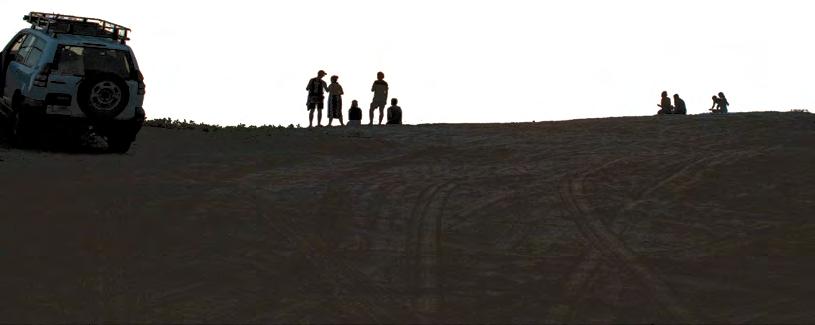

Injury Matters delivers the Road Trauma Support WA service through funding by the Road Trauma Trust Account and contract management by the Road Safety Commission. www.rtswa.org.au | 1300 004 814 (free call)
Supporting a mate after a road crash
Road trauma can cause someone to feel lost and the impact can be felt for months and even years later. If you or a mate has been impacted by road trauma below are some of the common trauma reactions that might occur:
Physical
• Heart racing more often
• Disrupted sleep
• Feeling nauseous
• Shallow rapid breathing Feelings
• Angry
• Sad
• Overwhelmed
• Helpless
• Worried
• Confused
Thinking
• Re-occurring thoughts about the crash
• Racing thoughts
• Trouble concentrating
Behavioural
• Increased use of alcohol or other drugs
• Avoiding social situations, like the Men’s Shed or the location where the crash occurred
• More irritable than normal
• Easily startled
How can I support someone after a crash?
Find a quiet place for a yarn and a cuppa and check in with a mate to see how he has been coping since the crash. If they continue to experience trauma reactions 4-6 weeks after a road crash, link them to additional support services like a General Practitioner (GP) or Road Trauma Support WA.
You don’t have to deal with road trauma alone. We’re here for you.
Whether you’re looking for information, support, or counselling for a mate who’s been affected by road trauma or you’re dealing with road trauma yourself, we’re here to listen and help. Talk to our friendly team on 1300 004 814 (free call), email us at admin@rtswa.org.au or visit rtswa. org.au
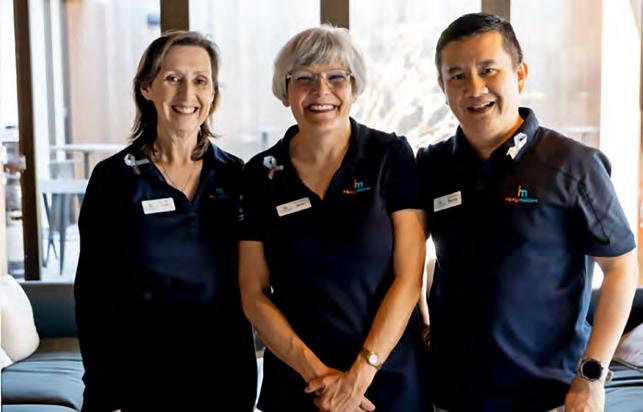
MAY 24 NEWSLETTER 19
Safety first
By Chloe Henville
Safety is at the core of the Men’s Shed mission: from creating a safe space to chat about life to ensuring every project is done without risk. This is why Men’s Sheds of WA is funding woodworking safety seminars through Perth Wood School, showing its commitment to the welfare of Shed members.
“At this stage we’re hoping to invest $20,000,” says Men’s Sheds of WA’s Senior Project Officer Jaxon Ashley.
“Sheds will have the opportunity to send two representatives to be trained in shed supervisor techniques.”
This means more of WA’s 182 Men’s Shed will benefit from the Shed Supervisor Workshop.
Mr Ashley says the two representatives will participate in a day-long workshop. The project aims to provide education back to the participating Sheds, by having the two trained members pass on what they have learnt to other Shed members.
He says he hopes this will empower more members to volunteer for leadership roles.
“When we ask about ‘why aren’t you stepping into those roles’, a lot of them are saying ‘we don’t feel that we’ve got the credibility’. That’s probably 50 per cent and the other 50 percent say, ‘I just don’t know if I’ve got the skill set,” Mr Ashley says.
“It’s two birds with one stone – the skill set is developed through the training and then hopefully... they have the credibility to supervise.”
Mr Ashley says giving members fulfillment by encouraging them to give back to the community is a big goal for Men’s Shed’s.
He says “Health and safety is important, of course, but Men’s Sheds of WA is more focused on participation and volunteering, so having the participants be willing to step up and become volunteers is really, really important to us.”
The sessions will be run by Perth Wood School proprietor David Howlett, who has over 30 years’
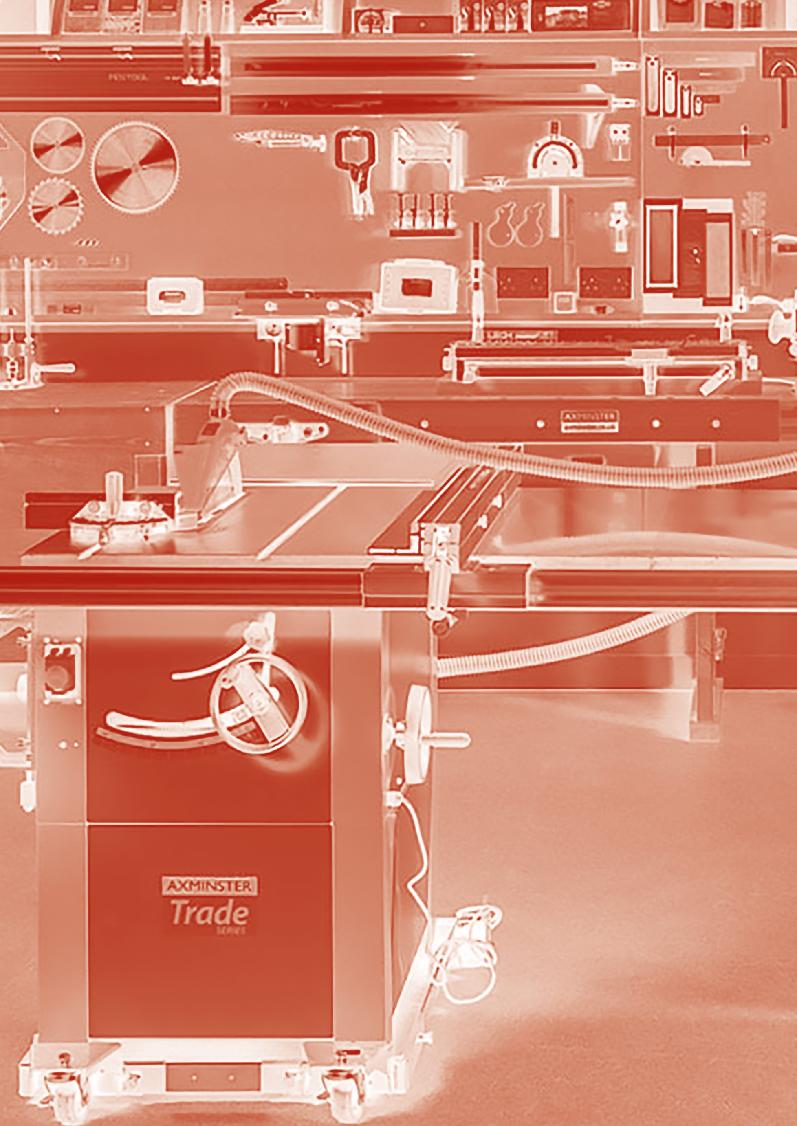
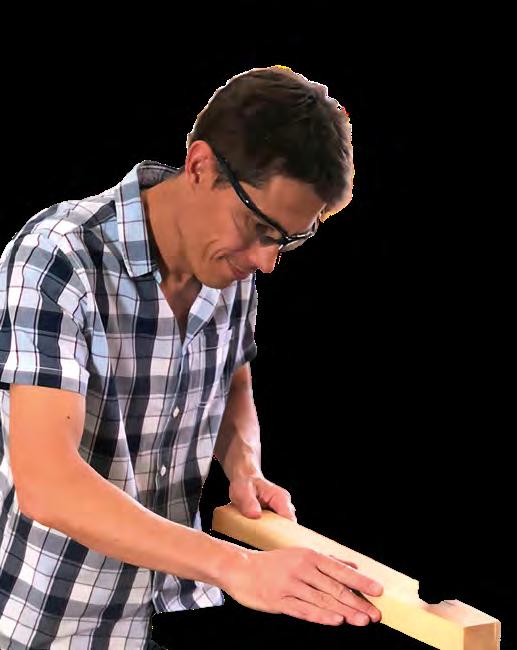
experience as a woodworking educator and has been running his own workshop lessons since 2007.
He believes the Perth Wood School follows the same ethos as Men’s Shed, by creating opportunities for self-expression, and assisting people to find a like-minded community.
“It’s also a fantastic pursuit for those people that have time on their hands and would also like to do something that keeps them active and engages their mind for problem solving, especially for bringing like-minded people together in a social setting,” he says.
Mr Howlett says although Mens Shed members have access to a variety of power tools, many lack the specific training needed to operate them safely.
“A lot of these workshops have very well equipped spaces with state-of-theart machinery, however, not so many have properly trained practitioners showing the members how to use the equipment,” he says.
“The main concern is that there are a lot of well-meaning amateurs showing other amateurs or new members how to use the equipment and very often, with the best of intentions, some of these members aren’t aware they are showing the incorrect way to use the gear.”
Mr Howlett says Men’s Sheds of WA are aware of the dangers of misusing equipment, and ultimately members safety is the utmost priority.
“Both me and the Men’s Shed executive [James Wild] have concerns that some shortcuts are being taken when using equipment that can potentially lead to severe injuries in the Sheds,” he says.
“And we just want to avoid that at all costs because you should never sustain an injury just because you’re trying to make something wonderful.”
Mr Ashley hopes the program will
be able to extend beyond Perth to spread the impact of the safety workshops around the whole state.
“For the regional and remote sheds, we’re going to attempt to send David to some regional centres such as Kalgoorlie, Geraldton and Albany,” he says.
Mr Ashley says while improving safety and training is always important, most Sheds already take it upon themselves to operate cautiously and keep each other safe.
“Something like this Shed Supervisor training is almost like a drop in the bucket of what they impose on themselves,” he says.
“It’s raising the floor rather than raising the ceiling – it’s just getting everyone up to a standard and then Sheds will exceed that standard.”
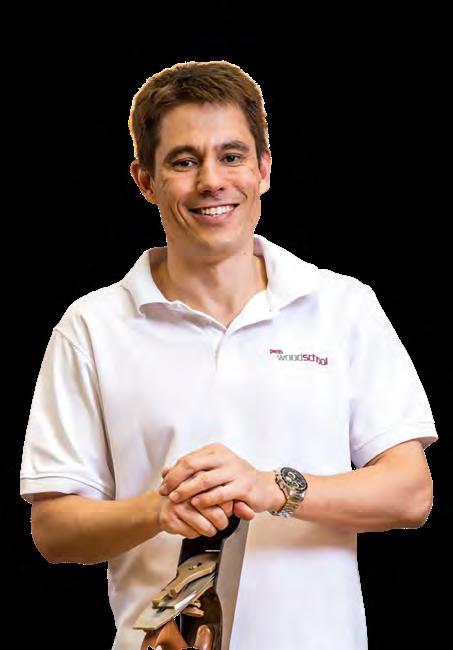
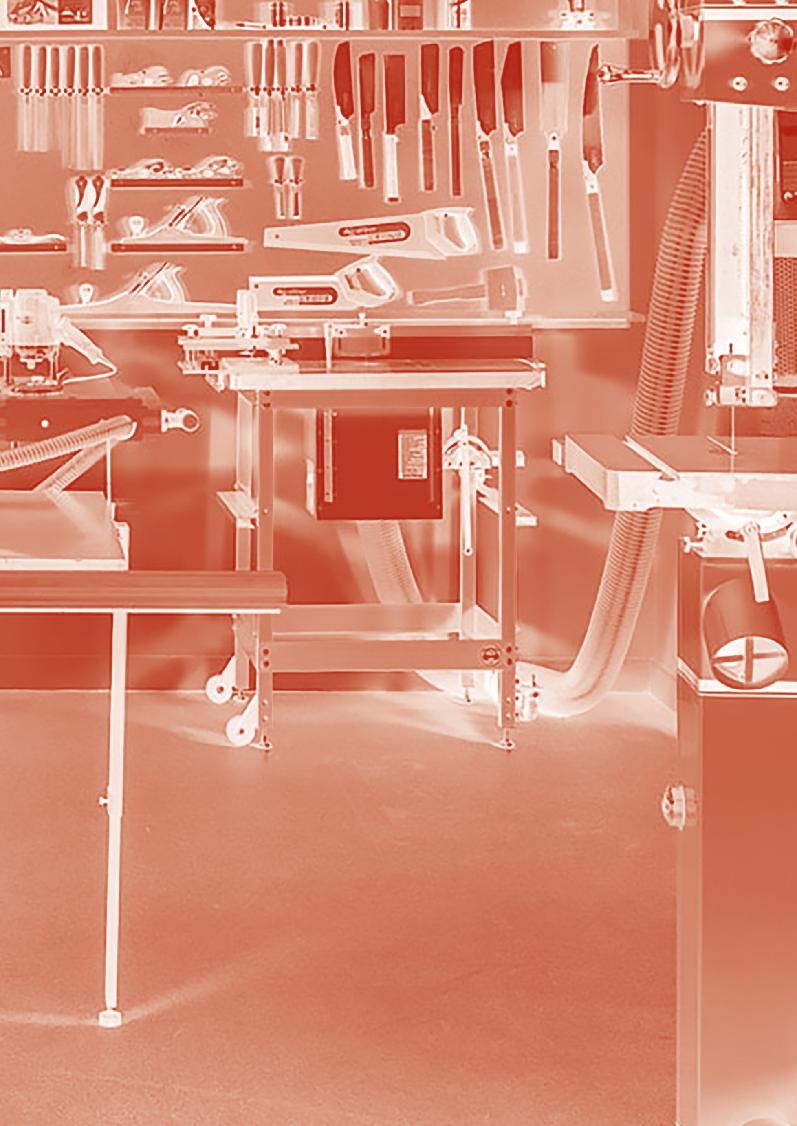
2024 Zone Meeting Summary
By Jaxon Ashley

Men’s Sheds of WA recently concluded a series of Zone Meetings across the state, marking a heightened period of community engagement and the sharing of news within the sheds. These gatherings, held in various sheds throughout WA, were not just meetings but also a celebration of the work and achievements that the Men’s Shed movement fosters.
Kicking off in the Midwest at the Geraldton Menshed on the 18th of March, the series of meetings traversed the state, culminating in the Goldfields with the Kambalda Men’s Shed on the 23rd of April. These events, strategically planned throughout March and April, brought together members from all types of sheds, in varying levels of development, to share information, opportunities and to create inter-shed camaraderie.
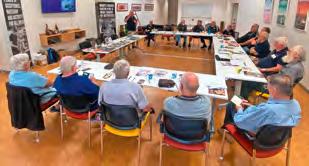
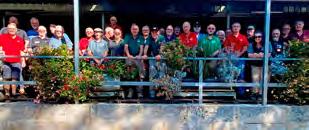
Though Zone Meeting days are long, going from 9 am to 3 pm, the meetings were packed with a robust agenda. After a welcoming cuppa, the official programs commenced with a ‘round the sheds’ session, led by Senior Project Officer Jaxon Ashley, where achievements, ideas and challenges were shared to help sheds to benefit from the experience of their peers from other sheds.
The importance of ‘telling your story’ was underscored by a moving address from Men’s Sheds of WA Chaplain Richard McAllister, highlighting the integral role Men’s Sheds play in the wellbeing of their members. A vital health update by Regional Health Coordinator Rebecca Talbot provided valuable information,
22 sheds wa
ensuring that members were abreast of best practices for their wellbeing within sheds. This knowledge was collected and shared demonstrating Men’s Sheds of WA’s commitment to the health and happiness of its community.
Insight was also offered by representatives from the State Emergency Service, and Department of Fire and Emergency Services, bringing to light the vital link between community service and personal fulfillment.
The host sheds provided lunch which offered an opportunity for sheds to network and chat. After which, a guest speaker chosen by the host shed to speak to the group about a topic that they believed would be of particular interest. The afternoon was rounded off with an informative session of news and updates from Jaxon Ashley, informing sheds of future developments.
Each Zone Meeting not only highlighted local achievements but also sowed the

seeds for future initiatives. By sharing stories, successes, and sometimes challenges, members left with a broader understanding of the state of sheds within their zone and as renewed sense of purpose and enthusiasm for the mission of Men’s Sheds – to support men’s health and wellbeing through social inclusion.
In total, the MSWA tea travelled 4,090km to visit 250 members from 77 sheds at nine locations around the state.
The MSWA extends its heartfelt gratitude to Lotterywest for their support, to the host sheds for their hospitality, and to all the members who attended and contributed to the success of these Zone Meetings.
The slides from the days presentations are available for future reference.
Photographs were taken throughout the day and they will be featured in Men’s Sheds of WA publications and online.
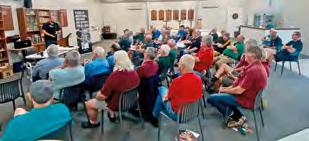
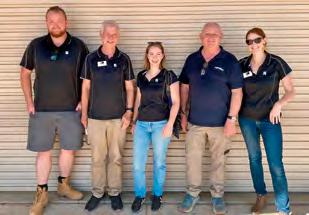
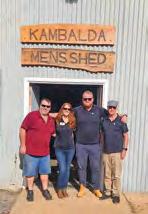
MAY 24 NEWSLETTER 23
Sheds Saving Lives Post-Retirement
By Rebecca Talbot and Richard McAllister
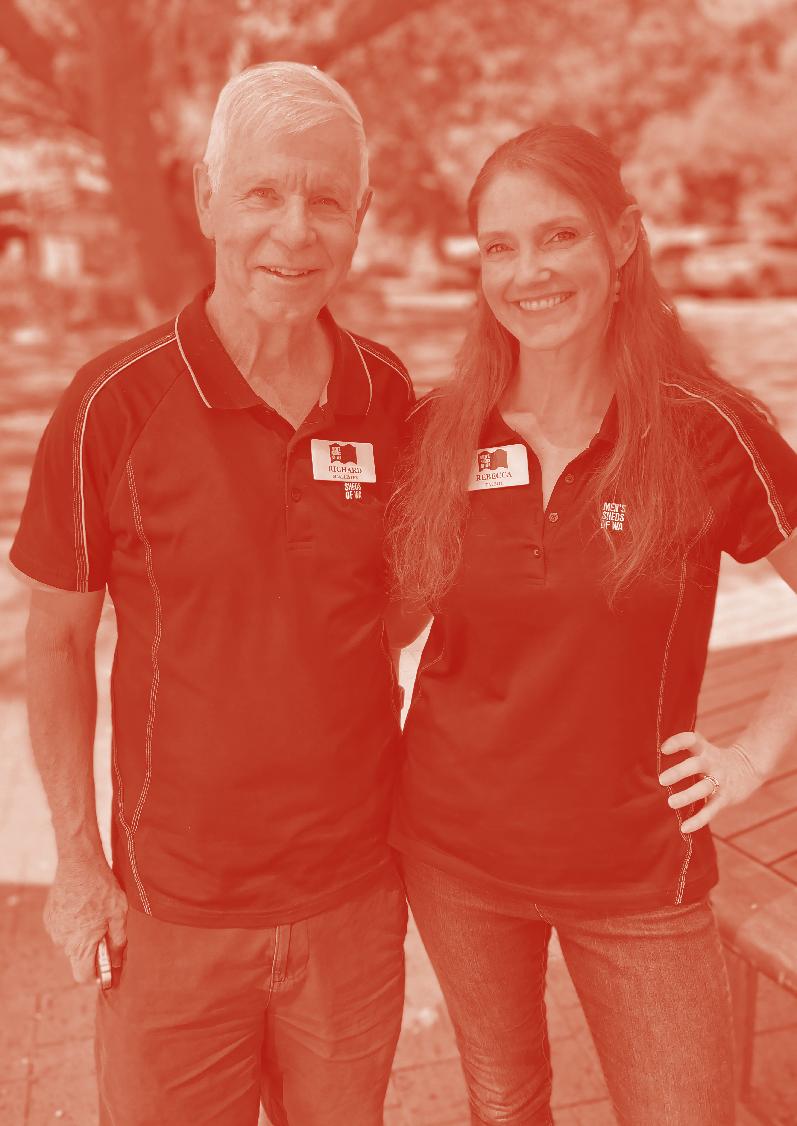
Retirement, a time once eagerly anticipated, can unexpectedly lead to a profound sense of loneliness and isolation for many men. The cessation of daily work routines can abruptly sever crucial social connections, and the transition from the bustling workplace to the quiet confines of home can be jarring, robbing men of the camaraderie and sense of purpose that defined their working years. Without the daily interactions with colleagues and the shared goals of professional life, many retirees find themselves grappling with feelings of isolation and loneliness, which can take a toll on their mental health.
The highest rate of suicide in Australia, for both men and women, is among people over 85. Older men die by suicide at 32.7 deaths per 100,000. Among these men, loss of purpose and identity after retirement can be factors, as well as weaker connections to children and grandchildren, and to social networks.
Enter the Men’s Shed movement — more than mere workshops, Men’s Sheds serve as havens where men can gather to pursue shared interests, engage in meaningful activities, and forge lasting friendships. From woodworking to gardening to car restoration, Men’s Sheds offer a diverse
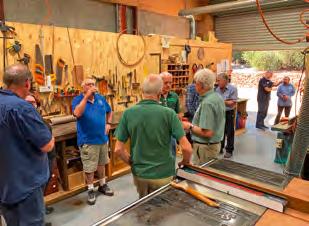
array of activities tailored to the interests of their members, fostering a sense of purpose and belonging in the process.
Research has demonstrated that participation in Men’s Sheds is associated with improved mental well-being, lower rates of anxiety and depression, and even reduced rates of suicidal ideation among older men.
Men’s Sheds of WA recently conducted a survey of 100 Shed Leaders and found 79% of respondents felt confident in the belief their Shed has helped prevent a Shedder from dying by suicide.
In a small Shed in the Southwest of WA, John* raises his coffee cup to his Shedder friends.
“If it wasn’t for these blokes here… I’d be a gonner. I retired, I sat in my armchair, and I went downhill.”
Throughout the past year, 96% of Sheds have run health related activities such as excursions and guest speakers, and put in check-in phone calls for absent members.
In essence, Men’s Sheds are not merely physical structures; they’re vibrant communities, bringing mateship and camaraderie to men during this significant life transition.
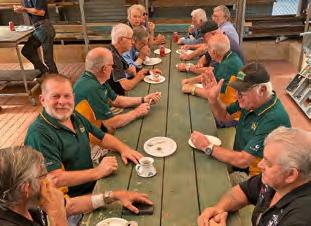
*name changed for privacy
24 sheds wa
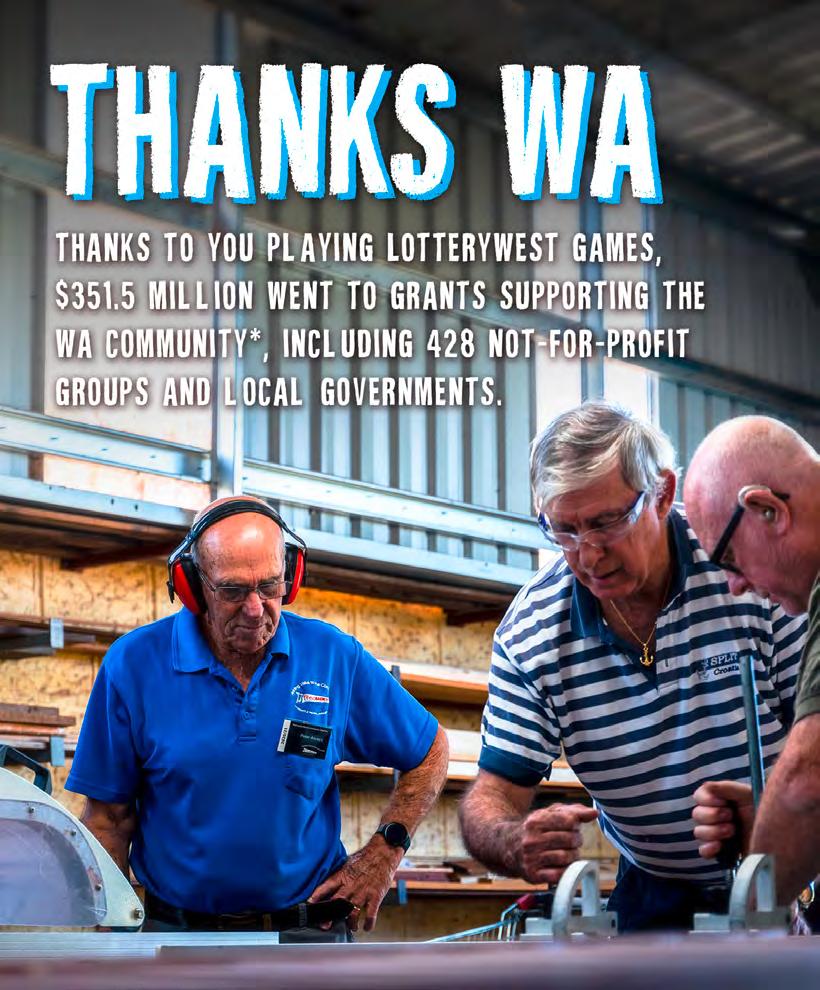
Play Responsibly 1800 858 858 gamblinghelponline.org.au *FY 2022-23
